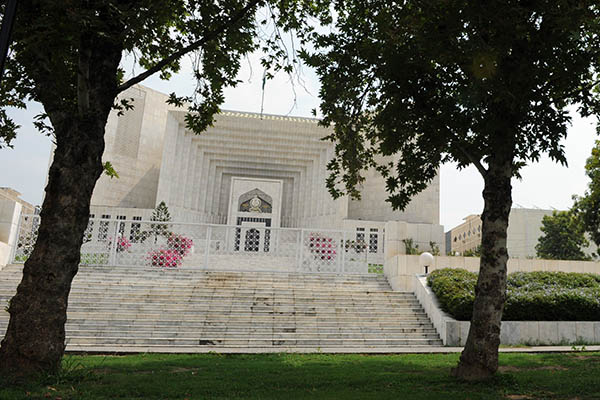
File photo. Aamir Qureshi—AFP
Chief Justice of Pakistan Umar Ata Bandial on Wednesday night took suo moto notice on the perception that “persons in authority” are undermining the criminal justice system to avoid prosecution.
“The honorable Chief Justice of Pakistan Umar Ata Bandial has taken suo moto notice, on the recommendations of an honorable judge of Supreme Court of Pakistan, of perceived interference in independence of prosecution branch in performance of its powers and duties for the investigation and prosecution of pending criminal matters involving persons in authority in the government today,” read a press release issued by the Supreme Court.
It said that it was believed that any “perceived interference” might influence the prosecution of cases, and also lead to the “tampering/disappearing” of evidence in courts or available with prosecuting agencies, as well as the transfers of officers on key posts. “Such actions, along with media reports to modify accountability laws, are likely to undermine the functioning of the criminal justice system in the country and that tantamounts to violation of fundamental rights affecting the society as a whole and eroding the confidence of the people in the rule of law and constitutionalism in the country,” it added.
The matter has been fixed for hearing today (Thursday) at 1 p.m. before a five-member larger bench headed by the chief justice. According to the cause list issued by the court, the rest of the bench would be comprised of Justices Ijazul Ahsan, Munib Akhtar, Sayyed Mazahar Ali Akbar Naqvi, and Muhammad Ali Mazhar.
The suo moto notice comes amidst the Pakistan Tehreek-e-Insaf’s repeated allegations that the incumbent coalition government is seeking to “influence” different pending cases against its leaders. Government ministers maintain that only those investigators or officers have been posted that were accused of victimization or inefficient work. However, the PTI’s narrative gained steam after Pakistan Peoples Party Co-Chairman Asif Ali Zardari—who is himself not in the federal cabinet—told journalists that his party did not wish to proceed to early elections until it had initiated reforms to accountability laws, under which several leaders of his party are currently facing corruption cases.
